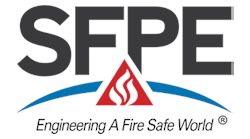CHICAGO ¯ No, it’s not the SWAT team or undercover FBI agents — it’s the crew of fire sprinkler retrofitters from Great Lakes Plumbing & Heating Co. For the past 20 years, the special retrofit team from this Chicago-based contractor has quietly installed fire sprinkler systems late at night in some of Chicago’s most prominent buildings without the tenants ever knowing until they spotted the new sprinkler heads above. As Chicago deals with the tragic deaths resulting from recent high-rise fires, Great Lakes’ expertise and methods are more relevant than ever for building owners and managers who are concerned about the cost and disruption of retrofitting.
“Many people have misconceptions about fire protection, and the benefits far outweigh the costs,” said Brian Conway, Great Lakes executive vice president and head of fire protection. “We have met with clients who thought in the event of a fire all of the sprinkler heads would go off and create significant water damage.”
Only the heads closest to the fire will go off. According to the National Fire Sprinkler Association, 90% of all fires are controlled by four sprinklers or less. Water damage from sprinklers is small compared to the damage that is created by firefighters using hundreds of gallons of water to put out a fire in an unsprinklered building.
In addition, fire protection technology allows for specialized systems designed for clients’ needs. In a building where vandalism may be an issue, tamper-proof technology can be used, such as a pre-action system that requires two activators, presence of heat and a smoke detector alarm, for the system to engage.
“Disruption to tenants and construction mess are not factors with our turnkey operations,” Conway said. His crew, with an average of 15 years of retrofit experience for each fitter, is accustomed to special installation conditions and often strange work schedules.
Recently, Great Lakes retrofitted sprinklers in Northwestern Memorial Hospital’s Prentice Pavilion for Women. The exacting job required maneuvering around labor and delivery rooms, operating rooms, inpatient care floors, an ambulatory care clinic, a neonatal intensive care unit and office space, all operating 24 hours a day, seven days a week.
“Sometimes we’d go in at 2 a.m. and end at 11 a.m., other days it was 10 p.m. to 4 a.m.,” Conway explained. “It really depended on our client’s preference and what worked the best for them.”
During the construction process for any of its nighttime clients, Great Lakes has drywallers and cleaners come in to keep areas patched and mess-free. Conway claims that Great Lakes is the only company in the Midwest that, for more than 20 years, has maintained such a highly specialized team that performs only retrofit jobs.
“We’ll continue to work this way because our clients expect flexibility and quality,” he added.
The initial costs of fire protection installation might be high, he said, but it is an investment rather than an expense. Returns on fire protection take the form of lower insurance premiums, tax write-offs, reduced liability and increased ability to lease.
Chuck Naso, president of risk management services for Orland Park, Ill.-based insurance brokerage The Horton Group, said retrofitting an existing building or updating to current codes can have a significant impact on property insurance rates. An owner can save as much as 75% to 80% in premiums on a sprinklered high-rise. If H.R. 1824 passes Congress, the current depreciation period on a sprinkler system would be reduced to five years and owners would enjoy an increased rate of return on retrofitting.
Great Lakes has been receiving a higher volume of calls from building owners since the fire in the Cook County Administration building (“Sprinkler ordinance gains momentum,” November, pg. 1). Tenants are increasingly demanding better safety measures in the places where they live and work. After recent fires in Chicago that claimed seven lives and left many more injured, tenants began calling owners, asking when they would see sprinklers in their building. Owners could be subject to lawsuits for loss of life or injuries due to a fire if their building is not up to current codes.
According to the National Fire Protection Association, property damage from fire is reduced 43% to 70% by sprinklers in public assemblies, educational, residential, institutional, commercial and manufacturing buildings.
Established in 1946, Great Lakes Plumbing & Heating is a full-service mechanical contracting firm specializing in complex plumbing, mechanical piping and fire protection. Within these fields, the company has the expertise to design, engineer, fabricate, and install projects on any scale. The company’s work can be seen in Chicago buildings as the Sears Tower, McCormick Place Convention Center, the Union League Club of Chicago, the Museum of Contemporary Art and the Palmer House Hotel. Great Lakes employs more than 300 sprinkler fitters, pipe fitters, plumbers, and office personnel from its office on Chicago’s northwest side.

